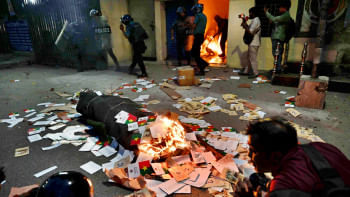Adoption of a balanced foreign policy
THE world is becoming smaller. We are all becoming interdependent more or less. Compartmentalisation no longer works. Bangladesh, a least developed and badly affected country due to global warming, particularly needs
goodwill and cooperation from friendly countries. Of course, it follows the foreign policy of "charity for all and hostility for none."
Public opinion in democratic countries became interested in foreign affairs since 1918. Before the First World War ordinary electors used to take a rather spasmodic interest in international relations. It was assumed that the foundations of foreign policy were based upon the changeless national and imperial necessities. As such, they stood outside the arena of party conflict. There was a feeling that foreign affairs were a specialised and esoteric study, the secrets of which lay beyond the scope of ordinary laymen.
The war of 1914-18 did much to change this negative attitude. It was realised that a country might be committed to policies involving definite pledges to foreign powers, and that if a major crisis arose, the people might be faced overnight with the alternative of having to either repudiate promises made in their name or else plunge into hostilities.
Furthermore, it is known that the effects of modern warfare are not confined only to professional soldiers, and that they force upon every individual citizen anxious ordeals, heavy anxieties and appalling dangers. Realisation of those facts encouraged the ordinary electors in democratic countries to adopt an attitude of less easy-going acquiescence and more continuous alertness towards international problems.
Sometimes the public confuses policy with negotiation. Foreign policy in democratic countries should be a matter for the cabinet to decide with the approval of the elected representatives of the people. The execution of the policy should be generally left to professionals of experience and discretion.
During the last 38 years, Bangladesh could not formulate a good foreign policy. In the past, we could never show our preparedness well because we failed to collect and collate enough vital information about a country like India, which has a strong statistical base. Bangladesh, on the other hand, has rather weak statistical base. In matters of negotiations, success depends to a large extent on presentation of facts and arguments based on accurate and appropriate statistics.
It is reported that there will be a summit meeting between Bangladesh and India in New Delhi on January 10. Before this there will be a high level meeting on sharing of Teesta waters.
The success or failure of the summit meeting depends much on India's attitude. As far as we know, the present Indian attitude is positive. So far as Bangladesh is concerned, what is important is maintaining a balance in its relations with the US, China, Russia and India. However, she need not concede her interest for any unjustified demand or pressure from any quarter for the sake of settlement of any dispute.
In the past, like many other developing countries, Bangladesh failed to attach due importance to public opinion because foreign affairs were considered a specialised and esoteric study, and beyond the scope of an ordinary layman's experience or judgment.
We need not be overoptimistic about the outcome of this summit meeting because it may have too many items in the agenda. However, we are hopeful of a fair amount of success because both the countries appear to be in a positive frame of mind. If we are capable of adopting a balanced relationship with India, China, the US and Russia there is every reason for us to expect the beginning of a new era of friendship with India.
This may depend to an extent on the capability of our ministry of foreign affairs to tackle the diplomats of these countries. With sincerity, commitment and hard work Bangladesh may be able to overcome its difficulties. We wish grand success of the meeting.

 For all latest news, follow The Daily Star's Google News channel.
For all latest news, follow The Daily Star's Google News channel. 



Comments